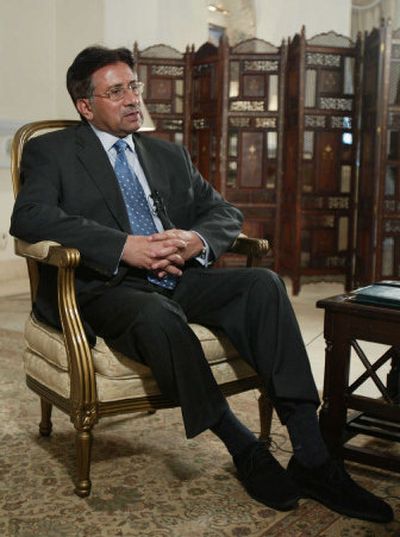Pakistan’s president bold with militants

RAWALPINDI, Pakistan – President Gen. Pervez Musharraf issued a twin challenge to Islamic militants in an exclusive interview with the Associated Press on Friday, praising Israel’s leader as “courageous” for withdrawing from Gaza and claiming to have crushed al-Qaida’s ability to operate in Pakistan’s cities and mountains.
Al-Qaida-backed assassins have repeatedly targeted Musharraf, who spoke ahead of the fourth anniversary of the Sept. 11 attacks and a visit to the United States. The Pakistani president’s openness to the Jewish state and grand plans to tackle the root causes of terrorism will further outrage Muslim hard-liners at home.
The 62-year-old military leader, who last week initiated Pakistan’s first high-level contacts with Israel, said the withdrawal of Jewish settlements from the Gaza Strip demonstrated Prime Minister Ariel Sharon’s ability to make tough decisions.
“I think such actions need courage and boldness,” Musharraf said. “What we have seen on the TV, Israelis not wanting to leave, being forced out, is a courageous thing to do. We hope that he shows (an) equal amount of courage finally in the creation of the Palestinian state.”
Musharraf said he had no new clues about the location of Osama bin Laden and his deputy Ayman al-Zawahri. He said the top al-Qaida leaders are probably hiding on either side of Pakistan’s rugged border with Afghanistan but are isolated and unable to order terror attacks.
He noted, however, that the terror network and its leaders remain symbolic motivators, with insurgents revering them and carrying around their photographs.
“I personally think, yes, there is an underworld of these organizations linked to each other,” Musharraf said. “Most dangerous is the financial underground. These linkages should be cut.”
Musharraf’s power remains firmly grounded in his decision to remain army chief. That move has raised growing questions about his commitment to democracy. On Friday, a nationwide strike called by the political opposition, partly over Musharraf’s Israel policy, led to shutdowns of shops in several cities.
But Musharraf has won plaudits, particularly in the West, for making difficult decisions and tackling some taboo issues in this Islamic state.
After the Sept. 11, 2001, attacks, he abandoned Pakistan’s support of Afghanistan’s Taliban regime and backed the U.S. invasion. He later launched bloody military operations against al-Qaida militants in Pakistan’s tribal regions, and held peace talks with archrival India.
Musharraf’s latest gambit was his gesture toward Israel, rewarding the Jewish state for the Gaza pullout. Held in Turkey, the meeting of foreign ministers sparked concern and fury among hardline Muslims who doubt Musharraf’s insistence that he will not form diplomatic ties with Israel until it allows the formation of an independent Palestine.
The Pakistani leader was upbeat about his military successes in the war on terrorism.
Musharraf said military operations have busted al-Qaida sanctuaries in Pakistani mountains near the border over the past two years. Where militants once gathered by the hundreds, now intelligence shows only a dozen or so can get together in one place at a time, he said.
“I don’t think that there’s a central command to al-Qaida organizing, managing, conducting terrorist actions all over the world,” Musharraf said, adding that those claiming to be al-Qaida were very unlikely to be taking orders from bin Laden.